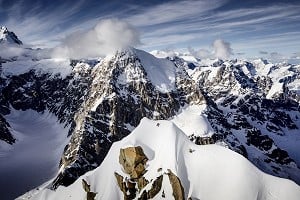
https://www.bbc.co.uk/news/science-environment-47806440
This rather odd article 'warns' that it may be possible for trees to grow in Antarctica again in the next few hundred years (giving almost no attention to the somewhat more alarming 10-20m sea level rise).
Anyway, those changes are probably going to happen, and things will probably be awful until it settles again.
But on the plus side, there's going to be a whole new, mostly virgin, continent to colonise, almost twice the size of Australia, with untapped resources and no indigenous people there. Who's going to get it, how will it be carved up? Obviously lots of countries have already staked their claims ( https://en.wikipedia.org/wiki/Territorial_claims_in_Antarctica ), but I can't imagine it'll end up like that with lots of nice pie-slice countries.
How will the colonisation happen - will it be wild-west style, pushing back the froniers as the ice melts, or more organised? How much of it will end up as independent countries rather than colonies of existing ones? There's a lot to be fought over; I suspect there will indeed be significant fighting.
If we experience sea level rises of 10m - 20m then swathes of the earth's current population will have nowhere to live (including for example almost all of Bangladesh, many huge coastal cities, and me - I live at 15m asl). The pressures of migration that will result are very unlikely to be resolved peacefully. Yes, we may need to "colonise" Antarctica, and Greenland, but that too is unlikely to be peaceful in those circumstances. It's slightly reassuring that the article talks in terms of thousands of years, but I'm not sure how confidently we can extrapolate from the natural processes of several million years ago to the man-made processes occurring today. The safe choice is to tackle climate change now.
Martin
> It's slightly reassuring that the article talks in terms of thousands of years
Not really.
"If you put your oven on at home and set it to 200C, the temperature doesn't get to that level immediately; it takes a bit of time," he told reporters.
"And it's the same with Earth's climate. If you ratchet up the level of CO2 at 400 parts per million (ppm), it won't suddenly get to an equilibrium overnight. It will take maybe 300 years or something.
> The safe choice is to tackle climate change now.
I don't disagree, but I think it's fantasy that it'll happen in time to stop massive anthropogenic climate change.
It'll be disastrous for billions while it happens, and worse the faster it happens; there's probably still some scope to slow it and so help that way, and that should not be ignored.
But this has all been discussed ad-nauseum. I'm interested here in something I see as very very exciting - the first colonisation and settlement of a new continent to happen in many thousands of years. We won't live to see much of it ourselves, probably just a little of the initial mineral exploitation, but I imagine we'll see the jockeying for position ramping up a lot over the coming decades.
> But this has all been discussed ad-nauseum. I'm interested here in something I see as very very exciting - the first colonisation and settlement of a new continent to happen in many thousands of years. We won't live to see much of it ourselves, probably just a little of the initial mineral exploitation, but I imagine we'll see the jockeying for position ramping up a lot over the coming decades.
I would have thought there would be far better candidates for colonisation. Mongolia has a population density of 2 people per square kilometre, so probably has space for a few more, and has a slightly more benign environment than Antarctica.
But, flippancy aside, large-scale population shifts are going to be one of the biggest problems associated with climate change, and may well result in considerable armed conflict. There is a certain irony in the fact that the industrialised West, responsible for most of the historical emissions, is rich enough to take appropriate mitigation against many of the climate implications, but is also likely to be the destination of choice for many climate migrants, unless serious efforts are made to increase the attractiveness of other destinations.
> I would have thought there would be far better candidates for colonisation. Mongolia
Population: 3 million.
You're a bit late, Mongolia's had people living in it for the best part of a million years, is already a country, and probably won't be very keen on letting you establish a colony there...
> Population: 3 million.
> You're a bit late, Mongolia's had people living in it for the best part of a million years, is already a country, and probably won't be very keen on letting you establish a colony there...
Ha! Fair point. However, I would say my suggestion stands, that there is plenty of room there for a few more.
Yep, we'll certainly be ssing huge population displacements, with some areas growing massively as others are depopulated (I imagine Russia's getting excited about the possibilities, for one) - but that's a different thing from a whole new continent gradually emerging from the ice!
With the accompanying rise in sea level then the continent that emerges from the ice will mostly be underwater. I read somewhere that without the ice, Antarctica would be the lowest lying continent.
> Ha! Fair point. However, I would say my suggestion stands, that there is plenty of room there for a few more.
There might be the room, but any land can only support a certain number to live there, dependent on the soil etc.. Has that particular country already reached its density limit ?
What about isostatic rebound? Surely that will have some effect on the elevation of the land? Look at the raised beaches on the east coast of Scotland.
I'm not sure about most of it, but some of it initially.
There will be isostatic rebound after the ice melts off, so it'll rise up (and further increase sea levels elsewhere to a lesser extent, I suppose).
But that'll take a bit longer (a few thousand years should do a lot of it), so parts will probably flood then rise out of the sea. Interesting, I hadn't considered that before.
A quick google finds these rather nice maps, which attempt to illustrate this (amongst other things):
Even if the ice did retreat to the extent of exposing sufficient soils for cultivation, there would not be enough sunlight to produce a worthwhile harvest. The fossils mentioned in the article grew when the continent was further north than its current polar position.
Unless someone can speed up continental drift by fiddling with the tectonic jigsaw, or displace the planet on its axis, there's going to be no corn fields in the Antarctic for a while.
About 1cm/year for 5 million years is only about 50km movement, not enough to make a huge difference to latitude. Stuff can grow there if it's warm enough.
Fair point about corn fields not being viable, though - they're going to need crops engineered to cope well with the shorter growing season. Not a problem that can't be solved over the next few hundred years, I suspect.
Well once the ice melts what is underneath? I would be surprised if it was nice agricultural soil ready for planting.
Also maybe the cities of lost civilisations will be found with temples to cthulhu and his gang.
Who knows what may awaken once disturbed?
and what about the insects to fertilise all the flowers?
> I would be surprised if it was nice agricultural soil ready for planting.
Yep, there's certainly going to have to be some soil improvement work.
> Also maybe the cities of lost civilisations will be found with temples to cthulhu and his gang.
There's probably also The Thing to contend with. Best not be in the first wave of settlers!
Plenty of crops don't need insect help, but insects will colonise Antarctica themselves as it becomes available. If the Lovecraftian Horrors From Under the Ice let them, anyway.
Lack of soil was the first thing that occured to me, it would take several thousand years for enough soil of sufficient fertility to form in order to grow crops. Soil takes a lot longer to form in cold dry climates so new soil formation would be at the slower end of the spectrum since Antarctica will always be one of the coldest places on Earth.
The other significant factor is that it is dark for 6 months of the year with all the implications of that.
The biggest hurdle would be the 'claims', as it stands 8 countries have some sort of claim.
> I would be surprised if it was nice agricultural soil ready for planting.
Blow up the boulders then crush the rocks and you’ve got something that with the addition of a bit of soil and fertiliser will grow stuff just fine. That’s how it’s done in other barren rocky areas.
But on the timescale of a few hundred years it may be that most food is grown industrially in standardised machines rather than on soil. This would be particularly suited to growing food at the polar regions where the sun isn’t much help.
> The biggest hurdle would be the 'claims', as it stands 8 countries have some sort of claim.
Well, the seven* claimant nations would like to think their claims will be a major hurdle, but they won't be. The claims are recognised by almost no country other than the seven themselves, they have no real legal force internationally, though each claimant nation has genuine domestic legislation that binds their nationals.
The Antarctic Treaty System has long been described as a 'gentlemens agreement' or 'boy's club' or colonialist's club or similar, and the defence has always been that it is also an excellent example of many nations working together peacefully to manage a global commons, to balance priorities and differences for the best outcomes. Like a model of good diplomacy.
But times change. The main factor is the rise of China, a non-claimant nation, and its ambitions for both polar regions. Just as navies can't stop whaling in international waters, Australia can't actually stop China building bases in 'their' territory.
https://www.abc.net.au/news/2019-03-30/china-in-antarctica-inspection-regim...
All the facets of the ATS rely on the foundation AT being in place. If a claimant pulls out, all falls down. For decades this has been unthinkable, much as a President Trump was unthinkable, or Britain leaving the EU to reclaim proper sausages and blue passports. Changes in the former 'first world' nations and the rise of China and India will have major repercussions for the ATS, and all its elements, such as a ban on mining.
The pie-chart claims will mean little. Access and logistics, determined by money, mostly, will dominate, and China is currently accelerating fast in this area. Australia is losing ground, the UK holding its own, maybe, and the US struggling. In 1983, India dabbled, with Malaysia and others, in trying to have the UN take control of Antarctica. They were fobbed off by the Old Boys, but if they regain interest, now with money, they may not be so easily dissuaded again.
* Seven nations claim territory, but in 1959 the (then) Soviet Union and the USA reserved the right to make claims, but did not do so then. They did however put bases at strategic points - the South Pole and Ross Island for the USA and many places on the perimeter for the USSR.
Yeah I worked with Biosecurity New Zealand trying to develop legislation to protect the flora and fauna. We worked with the other nations but it quickly became apparent we couldn't do much other than suggest best practice. NZ wanted to export its biosecurity approach as it was pretty much a pristine environment but they couldnt do anything.
But I cant see any of the 7 allowing a large scale settlement without some serious trade wars going on. Not for the land but for the fishing and oil rights which will come along. Its said to be what the Falkland's War was largely about.
> Plenty of crops don't need insect help, but insects will colonise Antarctica themselves as it becomes available. If the Lovecraftian Horrors From Under the Ice let them, anyway.
Of course there are but it'll certainly put a dent in the range on offer. and whose to say the type required, will be the type that get there?
Besides that of course, as PEC said, there's probably going to be a shortage of soil, and the microbes and fungi that are essential for proper plant grown.
> NZ wanted to export its biosecurity approach as it was pretty much a pristine environment but they couldnt do anything.
Antarctica hasn't been a pristine environment for over a century; the great whales and fur seals didn't just wipe themselves out, and there's no clear picture what the marine ecosystem looks like in a pre-Industrial baseline.
It's especially not true in the vicinity of coastal Antarctic stations. Australia and New Zealand have pretty laudably strict protocols now, but that's relatively recent compared to the history of the stations. There's plenty of fuel spills, building waste and wastewater impacts near ALL the stations.
I'm not saying that current protocols shouldn't be as strict as possible and that site remediation isn't important, but I get annoyed by the spurious trope from Antarctic programs and tour operators that it's a pristine environment
> But I cant see any of the 7 allowing a large scale settlement without some serious trade wars going on.
This is not currently true. Several asian nations are expanding their operations within the Australian claim, most obviously China (but also S. Korea and India). this isn't challenged by the Australian government, because they see it as an economic opportunity for Hobart to provide logistics support. Australian Antarctic Division recently announced a $450 million AUD upgrade to infrastructure (including a year round tarmac airstrip), in no small part due to this.
The economic exploitation of Antarctica has already begun (it's been going on and off for over a century) - it just doesn't take the form that most people think of. It's all about fisheries and logistics
It will soon be covered in plastic and other litter.
True but its about as pristine as it gets.
Interesting about the Asian countries developing operations. I hadn't heard about that but have been out of the field for over a decade.
> Interesting about the Asian countries developing operations. I hadn't heard about that but have been out of the field for over a decade.
It's pretty low-key, and since it's in East Antarctica nobody much has noticed. A NZ sociologist, Anne-Marie Brady, has been kicking up a fuss about China 'militarising' Antarctica.
I'm no fan of the CCP and I certainly have concerns about China's increasing funding of science in Australia, but in all fairness they're not doing anything in Antarctica that anyone else isn't, and they seem happy to submit to Antarctic Treaty inspections. To be honest, I think Brady just likes a bit of media attention.








